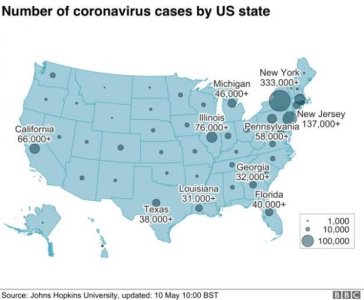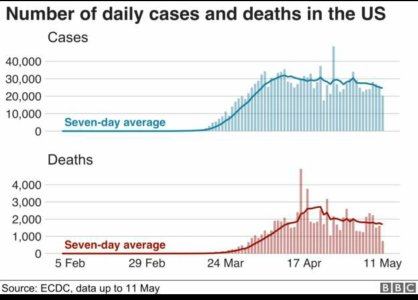Washington — Dr. Anthony Fauci, the nation's leading infectious diseases expert, offered lawmakers an update on the development of a vaccine against COVID-19 during testimony before a Senate committee Tuesday, his first appearance before Congress since March. In his opening statement, Fauci provided a timeline for vaccine development, saying that the National Institutes of Health hope to know if a key vaccine candidate is effective and safe by late fall or early winter. Fauci said there are at least eight vaccines in various stages of development.
"We have many candidates and hope to have multiple winners," he said. Fauci told senators the NIH has been collaborating with "a number of pharmaceutical companies at various stages of development." He mentioned that NIH is heavily involved in developing one with Moderna, which he said works on a messenger RNA platform.
Fauci also addressed his earlier assessment that it would take a year to 18 months to develop a vaccine.
"The NIH trial moved very quickly," he told senators. "On January 10, the sequence was known....On 14 January, we officially started the vaccine development. Sixty-two days later, we are in clinical trial with the two doses fully enrolled."
Now, that first phase is going "directly into...phase 2, 3...in late spring and early summer, and if we are successful, we hope to know that in the late fall and early winter."
"We have many candidates that hope to have multiple winners," he said. "In other words, it's multiple shots on goal."
However, Fauci said the idea that there will be treatments or vaccines available to facilitate return to schools in the fall would be "a bit of a bridge too far." And he also warned that "there is also the possibility of negative consequences where certain vaccines can actually enhance the negative effect of the infection."
Fauci is appearing remotely at the hearing with Dr. Robert Redfield, the director of the Centers for Disease Control and Prevention (CDC), and other officials to discuss reopening the economy amid the coronavirus pandemic.
He told CBS News before the hearing that he would in his testimony warn the country of the risks of reopening the economy too soon. He also planned to make the point — as a health professional — that there are a lot of things that people can do to get back to normal if they follow federal guidelines, and that the country must have the capability to prevent full blown outbreaks if there is another spike.
During the hearing, Senator Bernie Sanders, of Vermont, asked Fauci if he believes the true death toll is actually higher than current figures indicate. Fauci replied, "I think you are correct," because people died at home in New York at the start of the epidemic and were not counted as coronavirus victims. He said he doesn't know how much larger the true death toll is, but it is "almost certainly is higher."
The hearing is being conducted largely by teleconference. Although some lawmakers are in the room, some masked, others — including the chairman and ranking member and all of the witnesses — are appearing remotely.
In his opening statement, Senator Lamar Alexander, the chairman of the Senate Health, Education, Labor and Pensions (HELP) Committee, said that the country needs millions of more tests, in addition to greater tracking, treatment, isolation and eventually a vaccine.
"Staying at home indefinitely is not the solution to this pandemic," Alexander said.
Ranking Member Patty Murray in her opening statement criticized President Trump for choosing to "ignore the facts, and ignore the experts who have been clear we are nowhere close to where we need to be to reopen safely." She also called for a national testing system, as well as more personal protective equipment available to health care workers. Murray argued that Congress needs to work on another coronavirus-related package, although Senate Republicans have argued that it is unnecessary to immediately work on the next phase of legislation.
Redfield spoke about CDC's progress in assisting with the pandemic response, but said that it was still critical to maintain social distancing measures.
"It's important to emphasize that we're not out of the woods yet," he said. "We need to stay vigilant, and social distancing is imperative."
Food and Drug Administration Commissioner Stephen Hahn and Assistant Secretary for Health Brett Giroir are also appearing at the virtual hearing. Fauci is head of the National Institute of Allergy and Infectious Diseases and a member of the White House Coronavirus Task Force.
In his opening statement, Giroir projected that the country would be able to conduct 40 to 50 million tests per month by September.
Fauci is testifying despite going into "modified quarantine" following exposure to a White House staffer who tested positive for the virus. Over the weekend, Fauci told CBS News he is "low risk" based on the type of exposure he had to the staffer and is quarantining out of an abundance of caution. However, on Monday Fauci was at the White House, telling CBS News he is essential personnel and wore a mask while socially distancing.
His testimony before the Senate comes after the Trump administration blocked him from appearing before a House committee to discuss spending on coronavirus testing. President Trump told reporters last week that he doesn't want officials appearing before House Democrats, who hold the majority.
"The House is a setup," Mr. Trump said. "The House is a bunch of Trump haters."
The White House Office of Legislative Affairs sent a memo to all House and Senate committee staff directors last week that bars all members of the White House Coronavirus Task Force from appearing before a congressional committee without the permission of chief of staff Mark Meadows.
"For primary response departments, including HHS, DHS, and State, in order to preserve department-wide resources, no more than one COVID-related hearing should be agreed to with the department's primary House and Senate authorizing committee and appropriations subcommittee in the month of May, for a total of no more than four COVID-related hearings department-wide," the memo said.
White House press secretary Kayleigh McEnany said earlier this month that Fauci would not testify before the House Appropriations Committee because Meadows was told the hearing would be about funding for the Department of Health and Human Services, which she said would be a "rather odd fit" for Fauci, who works for the National Institutes of Health. She argued that it was "farcical" to say Fauci was blocked from testifying.
Fauci's testimony comes as several states begin to ease coronavirus-related restrictions, although health experts remain concerned about a second wave of the coronavirus. The economic fallout from the pandemic has been devastating, with the unemployment rate rising to 14.7% in April, the highest level since the Great Depression.
https://www.cbsnews.com/news/anthony-fauci-senate-testimony-coronavirus-pandemic-risks-reopening/









 ) lmaooo most hilarious pic I have seen in a while
) lmaooo most hilarious pic I have seen in a while How many workers should give their lives to increase our GDP by half a percent or the Dow Jones by 1,000 points?<br><br>MNUCHIN: "No workers should give their lives to do that and I think your characterization is unfair." <a href="https://t.co/JJ2aGy27BT">pic.twitter.com/JJ2aGy27BT</a></p>— Aaron Rupar (@atrupar) <a href="https://twitter.com/atrupar/status/1262754555063762948?ref_src=twsrc%5Etfw">May 19, 2020</a></blockquote> <script async src="https://platform.twitter.com/widgets.js" charset="utf-8"></script>
How many workers should give their lives to increase our GDP by half a percent or the Dow Jones by 1,000 points?<br><br>MNUCHIN: "No workers should give their lives to do that and I think your characterization is unfair." <a href="https://t.co/JJ2aGy27BT">pic.twitter.com/JJ2aGy27BT</a></p>— Aaron Rupar (@atrupar) <a href="https://twitter.com/atrupar/status/1262754555063762948?ref_src=twsrc%5Etfw">May 19, 2020</a></blockquote> <script async src="https://platform.twitter.com/widgets.js" charset="utf-8"></script>